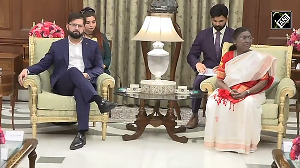As with the Women's Bill, so also with the proposed Lokpal legislation, the exercise is essentially one of grand posturing by all parties, says Neerja Chowdhury.
The Lokpal Bill being discussed in Parliament is reminiscent of the frenetic activity which surrounded the Women's Reservation Bill when it was introduced. It had evoked politically correct words from all parties as far as the political empowerment of women was concerned. But few in Parliament had favoured the bill.
Scratch the surface, and the situation is not very different with the Lokpal Bill. Members of Parliament across parties are expressing the desirability for an "effective and strong" legislation to curb high-level corruption. But when the chips are down, very few in Parliament actually favour the bill that has been tabled by the government to provide for the constitution of an ombudsman.
As with the Women's bill, so also with the proposed Lokpal legislation, the exercise is essentially one of grand posturing by all parties.
The government, however, is optimistic that it will be able to get the bill passed in the Lok Sabha, where the United Progressive Alliance has a majority. But it is not so optimistic about its fate in the Rajya Sabha. "Its fate in the Upper House hangs in balance," remarked a Cabinet minister delicately. If it is defeated in the Rajya Sabha, the bill will fall -- unless the government decides to call a sitting of the joint session of Parliament. It had resorted to this for the repeal of the Prevention of Terrorism Act, which was passed in one house but not in the other one.
The Women's Reservation Bill was passed by the Rajya Sabha -- courtesy the push given by Sonia Gandhi -- but it could not be brought to the Lok Sabha, given the opposition of the OBC parties on which the UPA depended. They tried to defeat it under the guise of wanting a sub quota for the OBC women under the 33 per cent reservation for women in legislatures.
The truth was that many in the Congress and the Bharatiya Janata Party, which had otherwise supported the Bill, fired off the shoulders of smaller parties to ensure that it did not get passed. All MPs were apprehensive that they might lose their seats in the one-third rotation provided for women in the bill.
In the case of the Lokpal, the government has brought in a bill, under pressure from civil society, but not many MPs, across parties, are convinced about it. This reluctance was reflected in the mood prevalent in Parliament on Tuesday. Though there were high points in the debate -- when Leader of Opposition Sushma Swaraj lampooned the Bill and Human Resources Development Minister Kapil Sibal rebutted her charges -- it was not the sense of Parliament debating what could have been a historic milestone after 42 years' wait which came through.
There are as many as 60 amendments which have been moved to the Bill. As the debate on the Lok Pal Bill was underway in the Lok Sabha, there was a feeling in parliamentary circles that the bill to create an ombudsman may get passed in the Lok Sabha but it may not get through the Rajya Sabha. The UPA enjoys a wafer thin majority in the Lok Sabha, with the entry in the UPA of the five-member Rashtriya Lok Dal, but it does not have a majority in the Upper House.
Even in the Lok Sabha, the Congress's allies, the Trinamool Congress and the Dravida Munnetra Kazhagam, expressed their disquiet that the bill would damage the federal spirit guaranteed by the Constitution. But even as the allies expressed their reservations, they were not expected to oppose the Bill when put to vote -- expected to take place late into the night on Tuesday.
Besides the BJP, the regional parties are agitated that the government had chosen to bring the Bill under Article 253 which makes it mandatory for states to bring in similar Lokayuktas, instead of moving through Article 252 which provides for the Centre to legislate what would have been only an enabling Lokayukta provision, not one that was mandatory for the states.
The government is hopeful of the passage of the bill in the Lok Sabha for another reason. In the clause by clause consideration of the bill, different parties may oppose different provisions of the proposed legislation and in the process "the critical sections of the bill may get passed". For instance, the BJP may oppose reservation among the Lokpal members but many of the regional parties, like the Samajwadi Party, Bahujan Samaj Party and the Rashtriya Janata Dal, were expected to support it, though some of them were opposed to other provisions.
The government was understood to be getting ready to accept a couple of amendments mooted by opposition parties, like making the panel to select the Lokpal less dependent on the government, with its troubleshooter Pranab Mukherjee holding meetings with different stake-holders. So it is possible that, as mooted by Sushma Swaraj, the Leader of the Opposition in the Rajya Sabha could be included in the selection panel. The government could also agree to review Section 24 of the bill which provides for the Lok Sabha Speaker and Chairman of the Rajya Sabha reporting to the Lokpal the action they have taken, or not taken, after an MP is chargesheeted -- something that would have the effect of bringing parliamentary officers under the Lokpal. These are possibilities, not certainties, at the time of writing.
The discussion on the Lokpal is taking place under the shadow of the impending elections in Uttar Pradesh and four other states. The Congress is keen to pass the bill in the Lok Sabha to establish its seriousness about combating corruption. Even if the bill does not get past the Rajya Sabha, the ruling party can legitimately argue that it succeeded where it had the numbers and could only try where it did not have the requisite arithmetic. The blame for the non-passage of the bill would then get shared equally between the ruling party and the Opposition.
It may suit the BJP -- the party came out strongly against the present bill and made a case for sending it back to the Standing Committee for further discussion -- to keep the Lokpal pot boiling. And it may hope to ride piggyback on Anna Hazare as he goes on his anti-Congress campaign through the five poll going states, if the bill to his liking is not passed.









 © 2025
© 2025